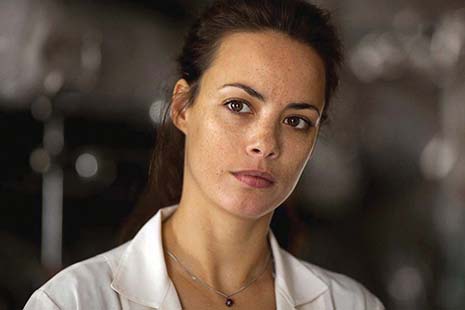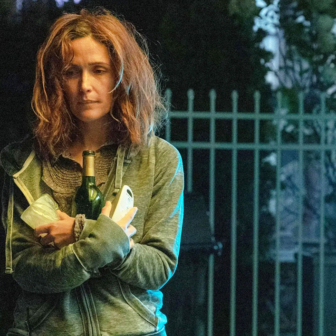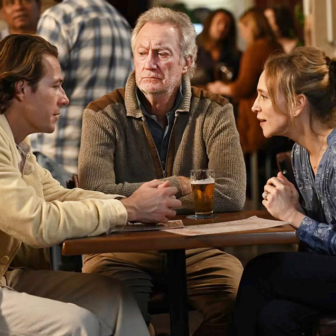THE WORD has been going around that Asghar Farhadi’s The Past (Le Passé) is somehow a lesser work than this director’s superb A Separation, in circulation last year. Begging to differ, I’d say: take a second look. The Past, family-centred like the earlier film, is not inferior but different, at once more extensive and more complex. It could sound like trite melodrama: a beautiful woman is on the way from her second marriage to her third, with children and stepchildren caught in the middle. We have a sullen, alienated adolescent making mischief with emails, a vulnerable, perceptive five-year-old, an almost-successful suicide attempt, and a whole network of threads linking the wife Marie (Bérénice Bejo), her daughters, her ex-husband Ahmad (Ali Mosaffa) and her lover Samir (Tahar Rahim), the latter’s small boy, an illegal Iranian immigrant and the fatherly neighbourhood cafe-owner, the benign watcher who knows them all.
The film is very much more than that list, and more than the weavings of the action. Farhadi’s skill, clarity and commitment are not so much to the tale as to all those we meet in its telling, and to the dynamics of their day-to-day lives. The centre shifts as we travel; the needs and desires of each emerge, become palpable, less in statements than in interchange, spoken and unspoken. The dialogue is not in Farsi now but in French; this is happening in a downmarket area of Paris, where the visible workplaces are a dry cleaners’, a pharmacy and Marie’s messy, cramped little house. The mess, the material details of weather, streets and windows, dishes and pans and bedding, crowd the narration, eloquently. Ahmad has come back from Teheran to be present, as required, when his divorce from Marie is finalised; he is immediately drawn into the roles of mediator in the struggle between Marie and her older daughter, and, comically, that of husband-handyman; he’s the one who can fix the blocked kitchen drainpipe.
He is also the Iranian immigrant who was drawn from Paris back to Teheran. Here in the West, he didn’t belong, but his return visit is catalytic. Samir is like him, but a little younger and simpler; he too is in the grip of an earlier story, and its force becomes apparent only at the end. In the shifting angles of vision, there are moments when the children own the story – Pauline Burlet’s Lucie, emotional heels dug in deep; Elyes Aguis as five-year-old Fouad, who knows so clearly what he doesn’t want, and where he doesn’t want to be; Jeanne Jestin’s Léa, who at seven knows that adults like her mother can be impossibly childish. Nothing is concluded, nothing wrapped up and tied off; that is the film's distinctive modernity. These lives will go on, all but one of them in a Paris where it seems to be raining forever.
This is a great film, from which a lot is asked of the audience, and a lot is given back.
IT’S NOT so often that a documentary fills two cinemas in one place and goes on filling them for weeks, and not so often that you get the film and its maker – some kind of phenomenon in himself – dividing audiences and setting off email debate across the globe. John Pilger is a stirrer. To put it less kindly, he is a preacher, a sermoniser, an evangelist. He’s dead sure he’s right, and he speaks as though no one else has been speaking, filming and writing on race relations in Australia, on Aboriginal suffering and resistance, through the past half-century; as though the many works of Langton and Pearson, Reynolds, Ryan, Cowlishaw weren’t abroad in the world. On film, there’s nothing in Pilger’s Utopia not already conveyed in the films of Warwick Thornton, Ivan Sen, Beck Cole, in Rabbit-Proof Fence and the documentary work of several decades. But with all that said, Utopia has cut through the silence and indifference of the present, setting off new arguments and new, defensive hostilities.
These were made plain in the barrage of online responses to Adam Goodes’s impassioned support for the film in Monday’s Sydney Morning Herald; go check. One respondent wrote that “films like this do irreparable harm. They promote victimhood and breed animosity.” Likewise, but more gently, the film-maker John Hughes – director of After Mabo, among much else – had one quiet, annihilating word for it: “counterproductive.” Another film maker I know, a documentarist who has fully paid his own dues in social exploration, walked out after half an hour, galled by Pilger’s incurably sanctimonious tone. Their view is shared by some Aboriginal viewers and thinkers; here he comes again, they say, old misery-guts himself.
Others, both black and white, are saying yes, but it doesn’t matter that it’s another Pilger sermon; he’s telling the truth, and it’s time to tell it again. In the years since the National Apology, they’re saying, Australia has gone back to sleep; this film is a necessary wakeup call. The critical question is whether it can really work like that. The film begins with a vox pop ramble on 26 January 2013; Pilger asks a few nonplussed tourists around Circular Quay why they imagine that for Aborigines this can be taken as a day of mourning. Their answers are so crass and ignorant that I wondered whether anything better-informed might have been cut; but I also wondered why Pilger didn’t seem to know that for many years now, Sydney Aborigines have marked the day not with a ceremony of mourning but with a terrific open-air concert, now called Yabun, which celebrates survival.
Director and crew go forth into central Australia, find the galvo-iron shanties and the women squatting on old blankets in the bush. A bloke who badly needs new teeth shows Pilger the wreck of an asbestos-riddled shack which, he says, is still home for seventeen people – the images here are like those in the opening sequence of Samson and Delilah. Under a succession of national governments of both stripes, some hundreds of millions of dollars have been allocated for Aboriginal housing in remote Australia. Where has that money gone? Pilger turns it into a whole fusillade of questions and accusations fired at Warren Snowdon, the responsible minister at the time when filming began more than two years ago. Later, there’s another fusillade for Kevin Rudd, who seems to be getting off a bit more lightly, but that sequence is frustratingly cut short. We revisit the death in custody of young Eddie Murray, meet his parents, and move through a country graveyard: you can’t but be moved by these who, old and innocent, died still asking for justice. Pilger revisits the most horrific death in custody, that of “Mr Ward,” who was cooked to death in fifty-degree heat in a prison van; and in the film’s most pitiless interview, he skewers the former minister Margaret Quirk, on whose watch that unforgiveable murder took place.
Much of the film archive called into service will be familiar to many, perhaps over-familiar: the men in the chain-gang, the uniformed and regimented children, the stories like Nanna Fejo’s of forced separation from mothers, bleak, institutionalised adolescence, lifetimes hollowed by loss.
Some have emerged saying there was nothing here they didn’t know already, but the force of the polemic is a demand that we don’t slide into believing that it’s just the way it was; Pilger is telling us, with unabated ferocity, that it’s still the way it is. He honours the survivors and leaders, like Rosalie Kunoth-Monks, Patricia Morton-Thomas, and not least Robert and Selina Eggington of Perth, who set up a healing room at Dumbartung after the suicide of their son.
At the film’s end Pilger reappears to remind us that until we properly acknowledge Aboriginal nationhood, we cannot claim our own. Like Rosalie Kunoth-Monks, he is calling for a treaty. On that – to say the least, after two centuries and more – they’re right.
OTHER parts of this month’s dispatch on cinema will appear soon. Meanwhile, I commend Margarethe von Trotta’s excellent Hannah Arendt, which will run in limited release from next week; not a biopic, but an essay in which the wonderful actor Barbara Sukowa plays the philosopher as she dealt with the trial of Adolf Eichmann, and gave offence to many in the radical way she theorised “the banality of evil.” •
This article was amended on 6 March 2014 to correct a factual error in relation to the healing room at Dumbartung.





